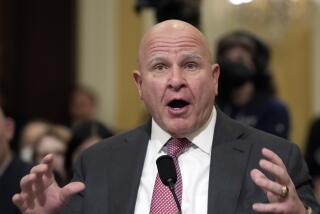THE IRAN-CONTRA HEARINGS : Says They Confer for 30 Minutes Daily : Carlucci Tells of Briefing President
- Share via
WASHINGTON — National Security Adviser Frank C. Carlucci said Thursday that he gives President Reagan “more rather than less” information--even “more than he wants”--in contrast to his predecessor, Rear Adm. John M. Poindexter, who said he deliberately withheld information on Iran- contra developments from the President.
Carlucci, during a rare on-the-record session with reporters, said he meets with Reagan for 30 minutes every day, twice as long as did Poindexter, who resigned last November because of his role in the Iran-contra affair.
Poindexter told the televised congressional hearing on the Iran-contra affair that, by keeping Reagan uninformed, he intended to protect him from political damage resulting from arms sales to Iran and the diversion of profits from the transactions to Nicaragua’s anti-Sandinista guerrillas.
A Career Diplomat
But Carlucci, a career diplomat who has served as deputy to the heads of both the Pentagon and the Central Intelligence Agency, said his philosophy is to “tell him (the President) more rather than less and on a wide range of subjects. . . . My responsibility is to tell him what he needs to know.”
“How is the President to learn if no one tells him? A President is somewhat circumscribed in the way he gets information. He’s dependent on the people around him to come forward with information. (White House Chief of Staff) Howard Baker and I give him, I’d say, more than he wants,” he added with a small smile.
During the last few months, every covert action program of the Administration has been reviewed and some have been canceled, Carlucci said. He refused to provide details, but there are reports that about 50 such programs had been begun since Reagan took office, a fivefold increase from the Jimmy Carter Administration.
New Philosophy
Carlucci also said the Reagan Administration’s new philosophy about covert action consists of three rules: An action should be a “tool of last resort.” “More important, it should be part of a broader policy.” It should have a specific “time frame,” or duration, rather than run indefinitely.
These new rules, he said, were warmly received by congressional intelligence oversight committees and will be formalized in a presidential order “in the near future.” The White House and Congress are also discussing the specific meaning of “timely notification” by the Administration of covert action programs that are undertaken.
Although the law requires such “timely notification,” which had been debated in terms of hours or days before the Iran-contra scandal, the White House did not notify Congress for almost a year of its secret arms sales to Iran or notify Congress that the President had signed a “finding,” or directive, indicating the operation was in the national interest.
Congress is expected to move to tighten restrictions on the CIA in response to the Iran-contra disclosures, and the White House may be seeking to head off new legal restraints on intelligence agencies by adopting reforms in advance.
Unlike the procedure in the past, when Lt. Col. Oliver L. North ran both the Iran and contra covert programs as a member of the staff of the White House’s National Security Council, Carlucci said: “The NSC will not implement covert action. The NSC is keeper (overseer) of the system. It is a conflict of interest to have us operate covert action programs. In every instance, covert action is now run through the CIA.”
More to Read
Get the L.A. Times Politics newsletter
Deeply reported insights into legislation, politics and policy from Sacramento, Washington and beyond. In your inbox twice per week.
You may occasionally receive promotional content from the Los Angeles Times.










